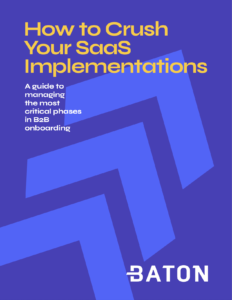From fintech to AI to healthcare tech (and everything in between), implementation and customer success have become pivotal aspects of any SaaS organization’s operations. Efficiently onboarding customers and ensuring their success with your software can significantly impact your bottom line and reputation. However, as your business scales and your software offerings diversify, it may become increasingly challenging to manage both these critical functions effectively. This is where the need for dedicated implementation managers arises.
In this blog post, we’ll explore the various factors and scenarios that signal the necessity of separating software implementation and customer success roles and the advantages of hiring dedicated implementation managers to oversee the implementation process.
The Evolving Role of Customer Success
Customer success has evolved from a post-sale function primarily concerned with customer support to a holistic strategy focused on nurturing long-term relationships, ensuring product adoption, and driving customer satisfaction. In many organizations, the customer success team has been tasked with overseeing the implementation process as well. While this approach can be efficient for smaller companies or simpler software solutions, it might not be sustainable as your business grows and your product offerings become more complex.
Signs It's Time for a Change

1. Increased Complexity
As your software solutions become more sophisticated, the implementation process can grow increasingly complex. Integrations, customizations, and migrations may require specialized expertise that goes beyond the scope of traditional customer success roles.

2. Resource Constraints
Customer success teams often find themselves stretched thin when handling both implementation and post-implementation support. This can lead to delays, miscommunication, decreased customer satisfaction, employee burnout, and even failure-to-launch churn.

3. Inconsistent Onboarding
If your customers experience inconsistent onboarding experiences, it could indicate a need for dedicated implementation managers. Consistency is key in ensuring customers start their journey on the right foot and successfully adopt and utilize your tool long-term. A disjointed experience with delays and inconsistent communication will negatively impact this experience.

4. Scaling Challenges
Rapid growth can make it difficult to maintain the quality of customer success and implementation processes. You may notice that your team struggles to keep up with the increasing demands. While throwing people at the problem isn’t always the answer to solving scaling challenges, adopting a standardized process with dedicated managers is key to future success.
The Role of Dedicated Implementation Managers
The SaaS realm is constantly evolving, yet ensuring a successful implementation remains a top priority for industry leaders. The accomplishment of SaaS implementations continues to hinge on the individuals and teams responsible for their execution. In your capacity as a software implementation manager, you hold a pivotal position in driving successful deployments.
After engaging in numerous conversations with implementation teams of varying sizes, ranging from one-person operations to large-scale teams, several core responsibilities have emerged consistently. In the following section, we present our findings to assist you in determining if it’s time to expand your org to include a dedicated implementation team.
Software implementation managers serve as the orchestrators of the SaaS project, much like conductors in a symphony. Their duties encompass a broad spectrum of tasks, spanning from the initial planning phase to the post-implementation assessment. Let’s delve into their primary roles:
Project Administration & Coordination
Project Planning & Strategy: Prior to immersing themselves in the implementation process, the software implementation manager undertakes a thorough and meticulous planning phase. This involves close collaboration with stakeholders to define project objectives, establish clear timelines, allocate necessary resources, and formulate a comprehensive implementation strategy.
Effectiveness in this role hinges on a profound understanding of how users interact with your product, early critical milestones in the customer journey, and a comprehensive grasp of prior implementation endeavors. This accumulated knowledge brings you to what we term the “Standardize” stage. At this juncture, your implementation process becomes templated, and you acquire a working proficiency in the most efficient deployment methods for your product.
Requirements Gathering: The success of implementation heavily relies on a profound comprehension of the client’s requirements. Implementation managers work closely with clients to meticulously collect comprehensive specifications, guaranteeing that the software solution perfectly aligns with the organization’s objectives.
Soft skills such as effective communication, curiosity, and organizational prowess play a pivotal role in accomplishing this task with excellence. This entails engaging in clear and meaningful dialogues with both the client and the sales team to gain a comprehensive understanding of the specific problem the client aims to resolve. Subsequently, you must adeptly convey this information in a concise and articulate manner to the broader project team.
Customization & Configuration: Frequently, SaaS applications require customization to align with the unique processes of a particular organization. Implementation managers are responsible for supervising the adaptation and setup of the software, guaranteeing its ability to effectively address distinct business challenges. It’s crucial to bear this consideration in mind throughout the requirements gathering phase.
Team Coordination: Implementation is a collaborative team endeavor. In this capacity, these managers bring together and guide cross-functional teams and external clients, which include developers, analysts, the client, and other consultants, promoting harmonious collaboration and ensuring the project advances seamlessly.
Technical Knowledge and Software Expertise
Risk Management: Every implementation project encounters its share of obstacles. Software implementation managers are adept at spotting potential risks, formulating strategies to mitigate them, and resolving any impediments to maintain the project’s course.
As you gain experience through multiple implementations, your understanding of risk management becomes more refined. Employing a robust system of record to monitor each implementation project is ideal. Baton, for instance, can be a valuable tool for tracking every aspect at the project, resource, and portfolio levels. With such a system, you can swiftly pinpoint and address bottlenecks.
Communication & Training: Effective and transparent communication holds paramount importance. Implementation managers play a pivotal role in fostering open dialogue among stakeholders and delivering training to end-users, ensuring they fully harness the potential of the new software.
This marks a significant divergence between a general project manager and a software implementation manager. In the latter role, you cannot rely on superficial knowledge of your product and still expect to be effective. People seek guidance from experts, and a substantial portion of your responsibilities involves assuming the role of an educator.
Quality Assurance: Comprehensive testing is essential to guarantee the flawless operation of the software. Under the supervision of software implementation managers, rigorous testing procedures are carried out to verify that the solution meets all predefined performance and functionality criteria.
Go-Live & Support: The critical juncture arrives with the software’s go-live date. Implementation managers maintain vigilant oversight during this phase, offering support, resolving issues, and ensuring a smooth transition.
Post-Implementation Evaluation: The journey extends beyond implementation. As an implementation manager, you carry out post-implementation assessments to evaluate the project’s success, pinpoint opportunities for enhancement, and gather valuable insights to inform future initiatives.
Implementing a Transition
Making the transition from combining customer success and software implementation to having dedicated implementation managers requires a strategic approach:
1. Assessment: Evaluate your current processes, team capabilities, and the complexity of your software solutions. Determine if it’s the right time to make the change.
2. Recruitment: If you decide to move forward, begin the process of recruiting dedicated implementation managers. Look for individuals with relevant experience and a track record of successful software implementations.
3. Training & Onboarding: Provide comprehensive training to your implementation managers to ensure they understand your software inside out. Collaborate with your customer success team to ensure a smooth handover process.
4. Communication: Clearly communicate the changes to your customers and internal teams. Make sure everyone understands the roles and responsibilities of the new implementation managers.
5. Establish Standardized Processes: Establish standardized processes and repeatable workflows to ensure consistency and reliability across your newly formed implementation team. Standardized processes and project templates will help your organization continue to scale operations effectively while maintaining high-quality implementations.
6. Consider a Purpose-Built Implementation Solution: As you expand your team, it may also be time to expand your technology stack. Software implementation projects have unique and complex needs, and adopting an implementation specific project management solution can help you achieve an efficient and quality implementation experience for all new clients.
7. Monitoring & Feedback: Continuously monitor the performance of your implementation managers and gather feedback from customers. Use this information to refine your processes and improve the customer experience.
When to Separate Software Implementation & Customer Success
In today’s competitive software market, ensuring a seamless and successful implementation process is vital to retaining and delighting your customers. While combining customer success and implementation roles can work in the early stages of your business, there comes a point when specialization becomes necessary for sustained growth and customer satisfaction.
Dedicated implementation managers bring expertise, efficiency, and consistency to the implementation process. They enable your customer success team to focus on what they do best – building long-lasting customer relationships and driving satisfaction. By recognizing the signs and making a strategic transition, you can position your organization for continued success in the ever-evolving world of software solutions.

Crush Every SaaS Implementation
Implementation is your first impression. Let us help you make it a great one.



